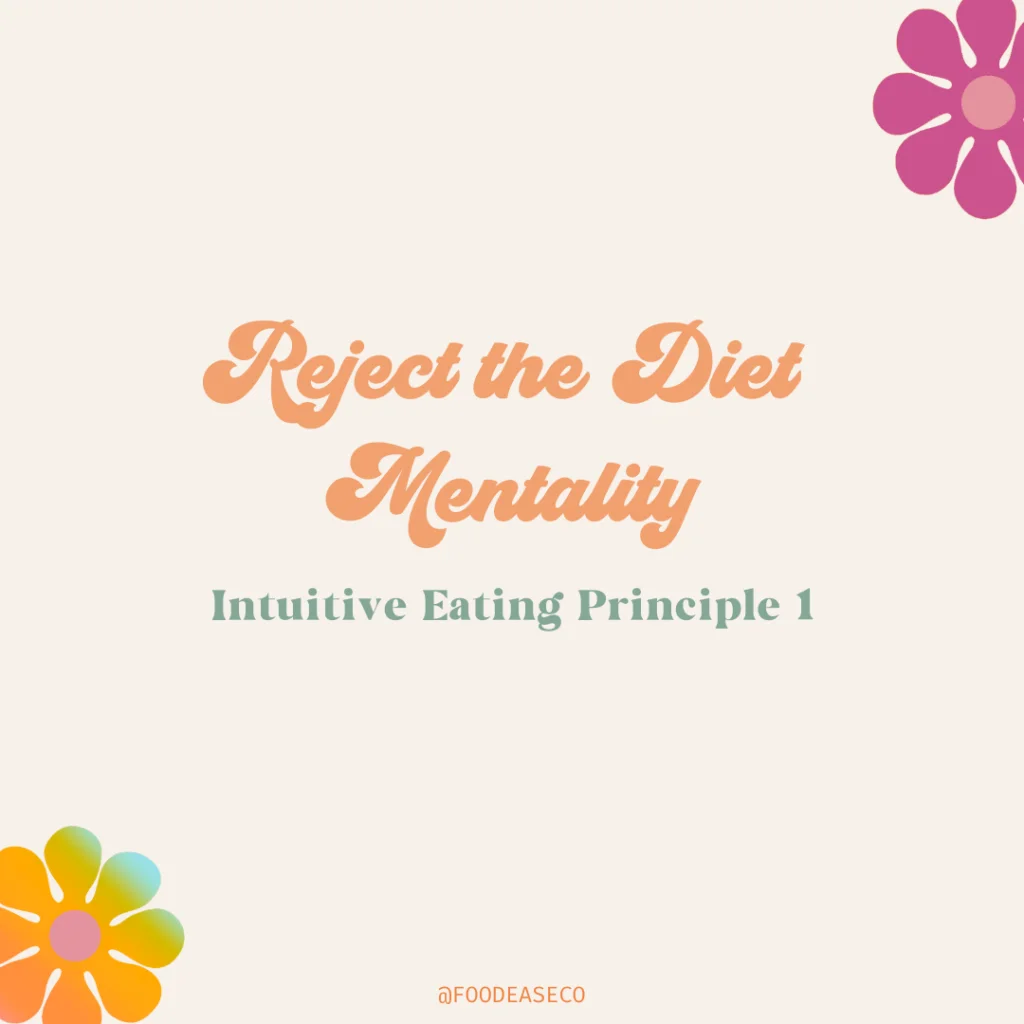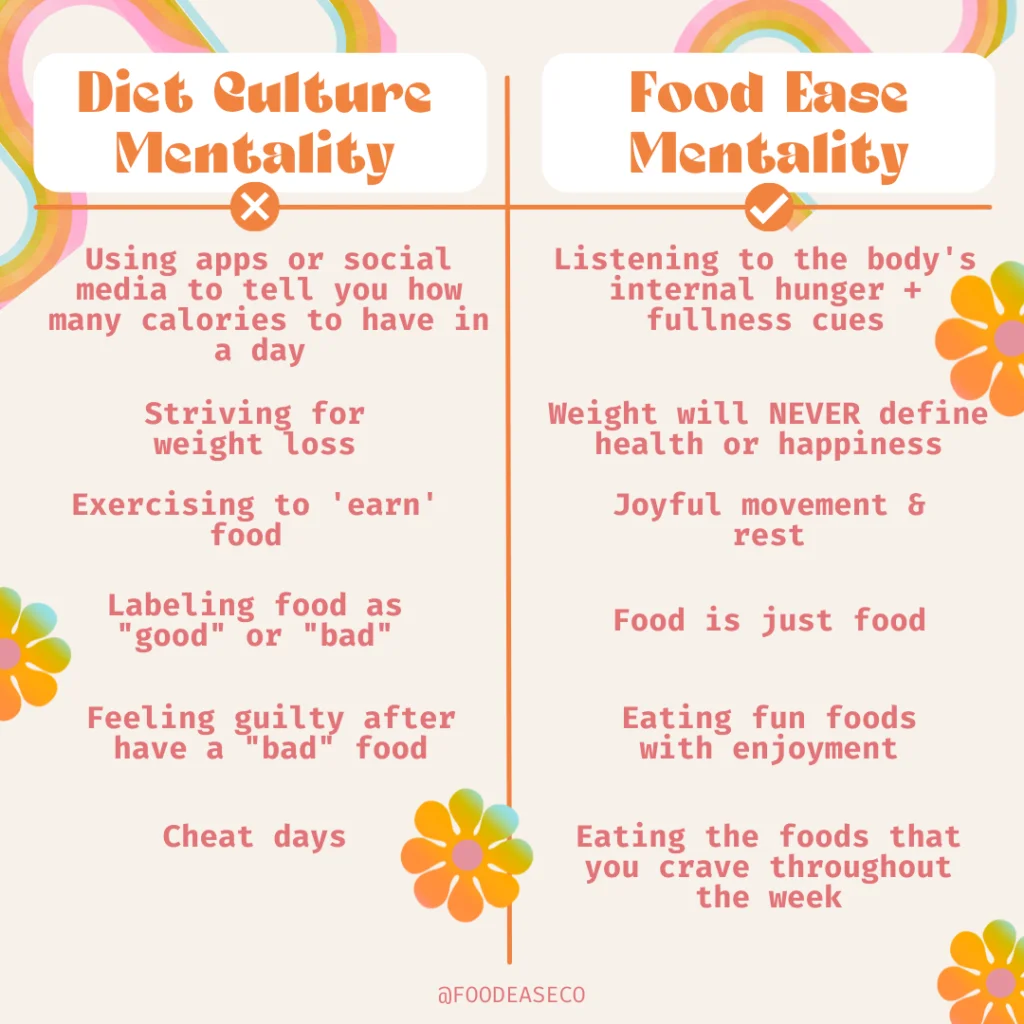Intuitive Eating Principle 1: Rejecting Diet Mentality

The first principle of intuitive eating is assessing and rejecting diet mentality.
But what is diet mentality?
It’s something that you are probably far more familiar with than you realize.
You’ve heard it all before:
Your esthetician is keto.
Your best friend is embarking on yet another round of whole 30.
Your mom is doing a juice cleanse (ugh).
Sound familiar?

Diet culture is all around us. It’s no wonder that almost 50% of adults in the US are trying a diet to lose weight each year and when 95% of those adults “fail” on their new diet, we are made to blame ourselves, not the diet.
What’s up with that?!
Well, I’m here to tell you there’s another way. Diet culture has a certain allure that seems to pull us back in, but once we recognize what it sounds (looks/tastes/smells) like, we can ditch the diet mentality for good.
Step 1: Recognize The Damage
These days, the word “diet” has been replaced with “lifestyle” or focuses on the pursuit of “wellness.”
Regardless of what we’re calling it, restriction in the hopes of weight loss rarely leads to long term health benefits.
First, let’s consider the physical harms of chronic dieting:
· More intense cravings and, potentially, binges
· Increased risk of premature heart disease
· Decreased satiety and hunger cues
· Slower metabolism
· Increased belly fat as a result of yo-yo dieting
And we haven’t even gotten to the psychological harms:
· Increased risk of disordered eating
· Increased stress and anxiety (especially around food)
· Loss of control around “forbidden” foods
· Decreased self-confidence
· Linking weight gain to a character flaw
If these side effects were listed on a drug pamphlet, we’d likely steer clear and yet, we pay thousands of dollars each year to try the new diet trends.
Step 2: Be Aware Of Your Thoughts & Language
This is where food rules with morality words come into play. It could look like…
· Having a treat and feeling like you need to burn more calories to “earn” it.
· Only counting exercise as a workout if you burned a certain amount of calories/had your heart rate in a specific zone/went “hard” for a certain amount of time.
· Measuring progress as pounds lost.
Eating (or lack thereof) is not a sign of “willpower” or “self-control.”
These terms emphasize diet mentality.
You are not a failure if you eat a donut.
Foods we eat (or don’t eat) do not define us or our character.
With intuitive eating, there is no “failure”.
If you eat “too much” or “too little” after a meal or snack, that’s valuable information to guide your next eating experience and grow more in touch with your body’s natural cues and messaging.
In reality, it’s a dynamic learning process that changes naturally day to day, and something that a dietitian like myself can really help you tap into.
Step 3: Scrap Your Diet Tools
A scale telling us our weight or an app that tell us how many calories we had that day tell us nothing about our INTERNAL CUES.
If we step on the scale and see a number we like, it may reinforce restriction. On the other hand, if we see a number we don’t like, it’ll send us down the spiral of restriction or, even, disordered eating.
Let’s not go down that rabbit hole again. For now, any tool that doesn’t serve a purpose with your relationship with food be should let go.
As you move further in your intuitive eating journey, you can use the Intuitive Eating Scale, a validated measure of intuitive eating.
Step 4: Find Self-Compassion
Diet culture is everywhere and it’s really easy to get pulled back in. This is where being nice to yourself comes into play. If you feel that pull (maybe after scrolling on Instagram) to get back on a diet, stop and think WHY that post made you feel that way.
Learning to eat intuitively takes time, patience, and compassion.
There will be setbacks, as this is not a linear journey, but think of these as learning opportunities rather than failures.
You’ll be better for it.
I encourage you to check out the new “Assessing Diet Mentality” resource on my website to take a short quiz and see where you fall with your diet mentality.
It includes an overview of this principle, 3 journal prompts to work through diet mentality, and a wrap up.
Stay Tuned for my post next week where we dive into the second intuitive eating principle –honoring your hunger!
Have a Question?


Do you have any questions or suggestions? Feel free to contact us! Just leave your email here, and we will get back to you shortly.